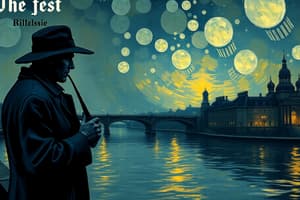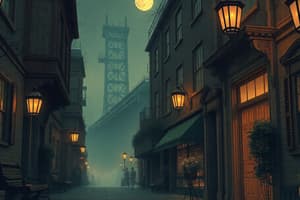Podcast
Questions and Answers
Early hard-boiled detective fiction is most associated with which publication, known for its influence on the genre's development?
Early hard-boiled detective fiction is most associated with which publication, known for its influence on the genre's development?
- _The New Yorker_
- _Esquire_
- _The Atlantic Monthly_
- _Black Mask Magazine_ (correct)
While early hard-boiled fiction writers like Hammett and Chandler focused on 'refined' style, which author is associated with a later, more sociopathic style that some purists argue deviated from the original genre?
While early hard-boiled fiction writers like Hammett and Chandler focused on 'refined' style, which author is associated with a later, more sociopathic style that some purists argue deviated from the original genre?
- Elmore Leonard
- Robert Parker
- Mickey Spillane (correct)
- Ross Macdonald
What is a defining characteristic of feminist 'hard-boiled' detective fiction in contrast to traditional forms?
What is a defining characteristic of feminist 'hard-boiled' detective fiction in contrast to traditional forms?
- A complete rejection of the 'loner' detective trope in favor of collaborative investigations.
- A greater emphasis on solving mysteries through intellectual deduction rather than violence.
- A critical perspective on the traditional 'hard-boiled ideological orientation' centered on white heterosexual men. (correct)
- An avoidance of urban settings, preferring rural or suburban environments for their narratives.
The author suggests that the term 'hard-boiled' is most accurately understood as describing:
The author suggests that the term 'hard-boiled' is most accurately understood as describing:
The concept of 'hard-boiled ideology,' as presented in the text, is primarily associated with narratives centered on:
The concept of 'hard-boiled ideology,' as presented in the text, is primarily associated with narratives centered on:
Critics who establish a 'high/low' division within hard-boiled fiction inadvertently:
Critics who establish a 'high/low' division within hard-boiled fiction inadvertently:
The text draws a parallel between the hard-boiled detective and the mythic American frontier hero to highlight:
The text draws a parallel between the hard-boiled detective and the mythic American frontier hero to highlight:
The assertion of 'realism' in hard-boiled detective fiction is often supported by:
The assertion of 'realism' in hard-boiled detective fiction is often supported by:
In hard-boiled stories, descriptions of 'others' (non-white, female, homosexual) frequently function to:
In hard-boiled stories, descriptions of 'others' (non-white, female, homosexual) frequently function to:
The recurrent depiction of body fluids and visceral details in hard-boiled narratives primarily serves to emphasize:
The recurrent depiction of body fluids and visceral details in hard-boiled narratives primarily serves to emphasize:
The text draws a significant comparison between hard-boiled fiction and Freikorps literature, primarily because of their:
The text draws a significant comparison between hard-boiled fiction and Freikorps literature, primarily because of their:
In Freikorps writing, 'the masses' are frequently portrayed as a 'damp mass' associated with:
In Freikorps writing, 'the masses' are frequently portrayed as a 'damp mass' associated with:
The Freikorps concept of 'body armor,' in the context of the text, refers to:
The Freikorps concept of 'body armor,' in the context of the text, refers to:
According to Theweleit's analysis of Freikorps fantasy, gunfire is depicted as transforming 'teeming masses' into:
According to Theweleit's analysis of Freikorps fantasy, gunfire is depicted as transforming 'teeming masses' into:
John Cawelti describes the hard-boiled detective as someone who rejects societal ideals to:
John Cawelti describes the hard-boiled detective as someone who rejects societal ideals to:
The concept of a 'hard-boiled army' in the text suggests that hard-boiled detective stories, when considered collectively, may:
The concept of a 'hard-boiled army' in the text suggests that hard-boiled detective stories, when considered collectively, may:
A reader's non-compliance with the 'basic hard-boiled identity' (white, heterosexual, male) becomes less significant if they are:
A reader's non-compliance with the 'basic hard-boiled identity' (white, heterosexual, male) becomes less significant if they are:
Fredric Jameson's 1970 observation that detective stories permit 'pure stylistic experimentation' suggests they can be seen as:
Fredric Jameson's 1970 observation that detective stories permit 'pure stylistic experimentation' suggests they can be seen as:
One critic, as quoted in the text, suggests that detective stories, while depicting 'our worst fears,' also bring forth:
One critic, as quoted in the text, suggests that detective stories, while depicting 'our worst fears,' also bring forth:
In the context of this text, the phrase 'hard-boiled ideology' most accurately refers to:
In the context of this text, the phrase 'hard-boiled ideology' most accurately refers to:
Flashcards
Hard-boiled detective fiction
Hard-boiled detective fiction
Detective fiction that emerged in American pulp magazines, known for its tough, unsentimental style.
Hard-boiled ideology
Hard-boiled ideology
The viewpoint of white, heterosexual men, central to traditional hard-boiled detective stories.
Mythic American Hero
Mythic American Hero
The archetype of a virtuous, solitary man who restores moral order in corrupt environments.
Hard-boiled world
Hard-boiled world
Signup and view all the flashcards
Othering in hard-boiled fiction
Othering in hard-boiled fiction
Signup and view all the flashcards
Excess in hard-boiled descriptions
Excess in hard-boiled descriptions
Signup and view all the flashcards
Realist language
Realist language
Signup and view all the flashcards
Overlooking differences
Overlooking differences
Signup and view all the flashcards
Study Notes
Hard-boiled Detective Fiction Origins
- The first hard-boiled detective stories came out in early American pulp magazines.
- Black Mask Magazine published hard-boiled stories starting in 1923.
- Notable authors include Erle Stanley Gardner, Dashiell Hammett, Raoul Whitfield, and Raymond Chandler.
- William F. Nolan considers these Black Mask writers to be the 'inventors and refiners' of the hard-boiled style.
Evolution and Definition
- Some believe hard-boiled detective fiction didn't last beyond the 1950s, with Mickey Spillane and Jim Thompson representing a more sociopathic version.
- Others argue that writers like John D. MacDonald, Charles Willeford, Elmore Leonard, Robert Parker, and Andrew Vachss continued the tradition into later decades.
- Feminist hard-boiled fiction, featuring tough female detectives, has recently gained popularity.
- These female-led stories are only superficially hard-boiled which lack the same ideological orientation as their male counterparts, despite exhibiting similar traits.
- The term "hard-boiled" describes a way of speaking and seeing, rather than just following a formula.
- Stories with non-white, male, heterosexual detectives critique hard-boiled ideology, even while using elements of traditional stories.
- A core hard-boiled ideology exists at the center of the genre and from the perspective of white, heterosexual men.
Hard-boiled Detective and the Mythic American Hero
- Like a Western hero, a tough detective's code allows violent action while maintaining moral purity.
- Isolation maintains the purity of honor in a false society.
- Academic critiques have discussed the meaning of hard-boiled stories, but have not fully explained the ideological significance.
- One approach legitimizes certain hard-boiled fiction by creating high/low distinctions.
- Another approach casts the hard-boiled detective as a post-industrial version of the Mythic American Hero.
- The hard-boiled detective descends from the frontier hero and restores moral order, like a cowboy.
- George Grella views the hard-boiled detective as another version of the cowboy, or an avatar of the prototypical American hero Natty Bumppo.
- Frederic Svoboda, Leslie Fiedler, and William F. Nolan have also compared the hard-boiled detective to the Western hero.
- Jerry Palmer suggests the detective's job is to carve civilization out of the wilderness.
- Dennis Porter calls the hard-boiled detective story a truncated American myth because the detective lacks a link with "true nature".
- Though set in an unnatural urban landscape, the detective takes a final test of self-worth through violent action.
Critique of High/Low Divisions
- Seeing the hard-boiled environment as wilderness and connecting it to the American heroic tradition overlooks those who define the hard-boiled novel's social composition.
- Approaches that impose a high/low hierarchy onto the genre make the social environment disappear.
- "Low" fiction is often left unexamined, while ideological continuity is ignored.
- Aesthetic criteria separate the high end from the low end.
- Critiques address the genre abstractly, legitimizing the high end by contrasting it with the "crap" at the bottom.
- This hinders discussion of how the hard-boiled social environment is constructed.
Class Divisions
- Ernest Mandel believes there is a high/low division is based on a historical degeneration regarding popular visual representation.
- Brutality and sadism in the genre became pronounced in the forties and fifties because of comic strips and television.
- Mandel argues that a "reversal to non-written language" stimulates primitive forms of thinking.
- Sinda Gregory divides the genre to "rescue" Dashiell Hammett, emphasizing his sensibility and complexity.
- George Grella explicitly distinguishes Hammett and Chandler, comparing them to Hemingway and Faulkner.
- Mickey Spillane exemplifies the "perversion" of the genre in "the hands of the unthinking and the inept".
Realism and Description in Hard-boiled Fiction
- The "realism" of hard-boiled detective stories is asserted by detectives, writers, and critics.
- This realism is found in the tough language, attitude, violence, and descriptions of "urban America".
- Frederick Svoboda claims the reader can get “bloodied by reality”
- James Cain and Raymond Chandler have contemplated realism and its relation to hard-boiled fiction.
Chandler's Perspective
- Chandler explains that the world of his stories is the world you live in.
- Writers can make interesting and amusing patterns out of it with tough detachment.
- Book jacket blurbs highlight the realistic nature of hard-boiled stories.
- Andrew Vachss's Blue Belle examines the darkest sides of life; Dashiell Hammett's works have realistic intrigue; Charles Willeford's early works have harsh realism; and John D. MacDonald knows dangerous things about people.
- Supposed realism implies that the hard-boiled writer and detective are ideologically detached from their subjects.
- The identities of people in the hard-boiled social environment are categorized as "reality".
- Readers should recognize this environment and corroborate its veracity.
- Hard-boiled language becomes a transparent documentary transmitter.
- Terry Eagleton comments that Realist literature conceals the socially relative nature of language
- It confirms the prejudice that there is a form of ordinary language that gives reality “as it is”
- The largest amount of space goes to description, not action.
- Fredric Jameson quotes Chandler: readers care about dialogue and description
- Dennis Porter notes the ideological significance of descriptive passages
- His findings suggest that this has to do with the "dark myth of the unredeemable city".
- Porter finishes with the hero uncovering not people, but "the corruption and perversion of society".
Dehumanization and the Construction of "Otherness"
- It's questioned whether Porter's reference to "corruption and perversion of society" is a meaningless phrase.
- Hard-boiled narratives revolve around demeaning descriptions of others, their perverted psychologies, and destroyed bodies.
- Descriptions focus on body fluids and viscera, characterizing non-white men, women, and homosexual/impotent white men.
- These descriptions construct a mirror against which a hyper-masculine identity appears.
- The self is defined by what it is not, establishing identity through negation.
- The hard-boiled man's perception must be addressed.
- Stories are set in threatening and realistic environments, such as large, urban, multiracial cities in the U.S.
- Robert Parker's Pale Kings and Princes features a Columbian immigrant population and is called "Miami North".
- Those who populate the hard-boiled detective story are described in terms of excess smell, body fluids, and desire.
Descriptions of Women
- An aggressive, sexually avaricious, and dangerous woman is at first presented as desirable and later discovered as perverted/immoral.
- Barbara Ann (Wild Wives) is described as a child with a pretty, innocent face.
- She is described is throwing herself over the detective's desk, asking to be spanked.
- Florence (Wild Wives) is a clinically diagnosed nymphomaniac, chronic liar, and husband killer.
- Velma (Farewell My Lovely) has tongue like a "darting snake" and leaves Marlowe feeling 'cold' and 'nasty'.
- Lauren (The Horse Latitudes) is a sexual sadist who sacrifices a man in an "ancient Mayan ritual".
- A painting of a female deity illustrates Lauren and generally the female threat.
- Destroying women are mentally diseased, while non-villainous women are physically diseased.
- Elena (The Way We Die Now), is described in what are intended as disinterested terms but clearly as grotesque.
- An older woman (The Girl in the Plain Brown Wrapper) describes herself as having the sexuality of a depraved and evil old hag and later degenerates because of her bowel issues.
Descriptions of Men
- Soft-boiled men psychologically exhibit feminine traits, such as cowardice, sexual perversity, and greed.
- Chinese bootleggers (Dead Yellow Women) have the smell of unwashed Chinese.
- The Continental Op smells "stinking bodies" and "unwashed Chinese".
- Ed Jenkins (Hell's Kettle) notices the abhorrent smell of Chinese while working as a doctor.
- Farewell My Lovely’s 'Hollywood Indian' wears a hat that has been perspired by somebody it fits better than him.
- Cundo Rey (LaBrava) is an effeminate Afro-Hispanic Cuban stripper who pleasures himself.
- The detective describes Cundo as 'sucking and smacking' as he 'squirmed and writhed'.
- Blue Belle’s detective describes New York City as a pit, and Hispanic hoods a torterer
- Hoke Mosley’s partner, Teddy Gonzales (The Way We Die Now) is described as a vain and clownish Latino or bed-wetter
Violence Evisceration and Mutilation
- Such detailed descriptive passages are also mirrored and intensified in hard-boiled descriptions of eviscerated bodies and body fluids
- Gruesome destruction described as carried out by or observed by the detective.
- In Dead Yellow Women, drug-addicted snitch "slid[es] down to the floor and ma[kes] more of a puddle than a pile there".
- Philip Marlowe (Farewell My Lovely) finds Lindsay Marriott 'lay smeared to the ground'.
- Hoke Mosley (The Way We Die Now) pounds Chico and causes Mexican bloodshed
- Jake Blake (Wild Wives) shoots the head and has blood from the violence
- Burke (Blue Belle) sees news of drowning 'boat people' with pus bleed out
- He slams a Grenade in a Asian mans mouth
- Is against child molester
- Danny (The Horse Latitudes) beats a Samoan
Freikorps Literature Comparison
- Just as Ferrigno calls someone Samoan
- Finally in The Horse Latitudes, there is a body with no sight
- Fascist Language appears to be unified around many points.
- Freikorps (German paramilitary organizations that fought after World War I) literature shares similarities with hard-boiled fiction.
- Theweleit analyzes Freikorps novels and memoirs.
- Freikorps descriptions of the working class, "Red Whore," and destroyed bodies are analogous to hard-boiled descriptions of "the foreigner" and "destroying woman".
- Metaphorical language is also similar.
Junger on the human race
- Junger calls the human race a mysterious tangled force
- The treetops are a mystery of force growing from the hazy earth.
- A hideous profusion of wildlife, victims and a forest of claws
- Examples in Blue Belle with zombies and vodoo
- Freikorps describes the post world war working class masses are damp, hybrid.
- In contrast is a soldier.
- Marlowe compares cops to civility
- The freikorps see mass habits as disgusting.
Perceived Feminine Identity
- The perceived feminine identity is written onto and in the aggressive whore
- Leads to the assumption
- It allows the soldier to be “whole”..
- The Freikorps writing is related
- Travis Magee can feel this within his skin: “the impact had Jelied her”
Another View of The Freikorps
- Relates how a soldier will shoot into a slobering and asking is this really the end
- In Freikorps The gunfire changes empty space that is the flick of a switch creates emptiness
- The continental op does everything here
Hard Boiled Context
- The detective is set on a military course
- The hard boiled detective rejects ideals.
- As well as Freikorps has the male can create himself
- In this creation the army is the
- The way the solider belongs The Freikorps solider is a unit to the army machine
- The other soldier units work from different units and sides
- He has help parentless relationships
- It might point out is the “hard boiled” member
The Army Of Freikorps
- The story does not have family
- One might suggest
- The hard boiled army to
- The heros might go by himself but
- It has army of white hero
- The ideology has very striking comparisons
Mythic American Hero
- One context is to relate the hard boiled store
- The force provides the harboiled genre is to seperate people.
- The writer the moment they read has to be the norm
- I suggest its not to make sure its known
- The reader can get by there actions through force
- Its very meaning is denied to one's life.
Studying That Suits You
Use AI to generate personalized quizzes and flashcards to suit your learning preferences.




